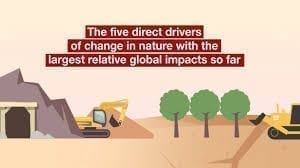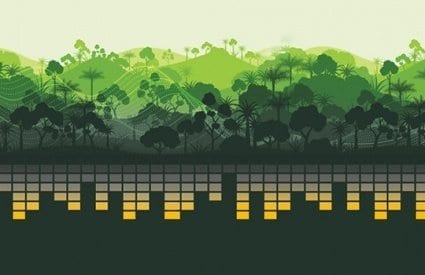
The accelerating disappearance of Earth’s species of both wild and domesticated plants and animals constitutes a fundamental threat to the well-being and even the survival of humankind
The accelerating disappearance of Earth’s species of both wild and domesticated plants and animals constitutes a fundamental threat to the well-being and even the survival of humankind, warns the founding Chair of a new global organization created to narrow the gulf between leading international biodiversity scientists and national policy-makers.
In Norway to address an elite gathering of 450 international officials with government responsibilities in the fields of biodiversity and economic planning, Zakri Abdul Hamid offered his first public remarks since being elected in January to head the new Intergovernmental Science-Policy Platform on Biodiversity and Ecosystem Services (IPBES) — an independent body modeled on the Intergovernmental Panel on Climate Change.
Dr. Zakri, a national of Malaysia who co-chaired 2005’s landmark Millennium Ecosystem Assessment and serves also as science advisor to his country’s prime minister, cited fast-growing evidence that “we are hurtling towards irreversible environmental tipping points that, once passed, would reduce the ability of ecosystems to provide essential goods and services to humankind.”
The incremental loss of Amazon rainforest, for example, “may seem small with shortsighted perspective” but will eventually “accumulate to cause a larger, more important change,” he said. Experts warn that ongoing climate change, combined with land use change and fires, “could cause much of the Amazon forest to transform abruptly to more open, dry-adapted ecosystems, threatening the region’s enormous biodiversity and priceless services,” he added.
“It has been clear for some time that a credible, permanent IPCC-like science policy platform for biodiversity and ecosystem services is an important but missing element in the international response to the biodiversity crisis,” Dr. Zakri told the 7th Trondheim Conference on Biodiversity.
The Millennium Ecosystem Assessment “demonstrated that such an intergovernmental platform can create a clear, valuable policy-relevant consensus from a wide range of information sources about the state, trends and outlooks of human-environment interactions, with focus on the impacts of ecosystem change on human well-being. It showed that such a platform can support decision-makers in the translation of knowledge into policy.
“The Millennium Ecosystem Assessment provides our baseline,” he said. “The IPBES will tell us how much we have achieved, where we are on track, where we are not, why, and options for moving forward. It will help to build public support and identify priorities.”
The structure of IPBES mimics that of the IPCC but its aims go further to include capacity building to help bridge different knowledge systems.
“IPBES will reduce the gulf between the wealth of scientific knowledge on declining natural world conditions, and knowledge about effective action to reverse these damaging trends,” he said.
Even barnyard diversity is in decline
Some scientists have termed this the “sixth great extinction episode” in Earth’s history, according to Dr. Zakri, noting that the loss of biodiversity is happening faster and everywhere, even among farm animals.
He underlined findings by the UN Food and Agriculture Organization that genetic diversity among livestock is declining.
“The good news is the rate of decline is dropping but the latest data classify 22% of domesticated breeds at risk of extinction,” Dr. Zakri said.
Breeds become rare because their characteristics either don’t suit contemporary demand or because differences in their qualities have not been recognised. When a breed population falls to about 1,000 animals, it is considered rare and endangered.
Causes of genetic erosion in domestic animals are the lack of appreciation of the value of indigenous breeds and their importance in niche adaptation, incentives to introduce exotic and more uniform breeds from industrialised countries, and product-focused selection.
Among crops, meanwhile, about 75 per cent of genetic diversity was lost in the last century as farmers worldwide switched to genetically uniform, high-yielding varieties and abandoned multiple local varieties. There are 30,000 edible plant species but only 30 crops account for 95% of human food energy, the bulk of which (60%) comes down to rice, wheat, maize, millet and sorghum.
“The decline in the diversity of crops and animals is occurring in tandem with the need to sharply increase world food production and as a changing environment makes it more important than ever to have a large genetic pool to enable organisms to withstand and adapt to new conditions,” he said.
The Latest Bing News on:
Farm animal diversity
- Fiddleheads, Not Spinachon May 17, 2024 at 5:00 am
We are crouched on our hands and knees, ripping out lettuce at Andrew’s Farm in Gardiner, Maine, where I work. “Some of them might be slimy,” says the ...
- Diversity creates new farm business opportunitieson May 17, 2024 at 2:35 am
As dairy farms in Buffalo County, Wis., dwindle, Joe Bragger explains that unique opportunities boost farm profit potential.
- Governors Island puts sheep baaaack to work clearing invasive plantson May 16, 2024 at 9:30 am
Five sheep have traveled from upstate to save Governors Island – from invasive plant species. The sheep, named Chad, Evening, Philip Aries, Bowie and Jupiter, have cleared out over 14 acres of ...
- Who chooses the animals that live at OKC Zoo? Meet the zoo's chief of animal programson May 16, 2024 at 4:01 am
Dr. Jennifer D'Agostino gives The Oklahoman a behind-the-scenes look at the OKC Zoo and its role in helping to support conservation efforts ...
- Researchers conduct first-ever study to characterize microbiota in saliva of weaned pigletson May 15, 2024 at 10:33 am
Bacteria of the phyla Firmicutes and Proteobacteria, including those of the genus Streptococcus, are the most common microorganisms found in the saliva of swine, which contains a different microbiota ...
- PCC's $4M barn will enhance its veterinary services programson May 14, 2024 at 6:21 am
The facility is billed as a jobs creator, as veterinary tech services positions are increasingly hard to fill.
- Changing How We Farm Might Protect Wild Mammals—and Fight Climate Changeon May 6, 2024 at 2:00 am
Nearly a quarter of U.S. mammal species are on the endangered species list. Researchers say farming with biodiversity in mind may help stave off further decline.
- Animal-Welfare Organizations Sue FDA Over Allowable Feed Additiveon March 29, 2024 at 12:24 pm
The Animal Legal Defense Fund, Center for Biological Diversity, Center for Food Safety ... concerning using the feed additive ractopamine in farm animals. Together, the organizations are asking ...
- Legal Action Launched to Protect Hippos Under Endangered Species Acton February 14, 2023 at 4:00 pm
The Center for Biological Diversity is a national ... rescue and protect dogs and cats, improve farm animal welfare, protect wildlife, promote animal-free testing and research, respond to natural ...
- Diversity in the labon March 23, 2022 at 6:56 pm
An interview with William A. Hill, DVM, DACLAM, Assistant Director in the Office of Laboratory Animal Care and Director of Diversity for the College of Veterinary Medicine (CVM) at the University ...
The Latest Google Headlines on:
Farm animal diversity
[google_news title=”” keyword=”farm animal diversity” num_posts=”10″ blurb_length=”0″ show_thumb=”left”]
The Latest Bing News on:
Barnyard diversity
- Harvard Should Reject the DEI Version of Diversityon April 27, 2024 at 5:00 pm
In mid-April, the Harvard Crimson reported that “Vivian Y. Hunt ’89 will serve as the next president of the Board of Overseers, the University’s second highest governing body.” The ...
- Diversity is Deliciouson April 21, 2024 at 5:50 am
Originating April 22, 1970, this is our 54th celebration. San Jose’s Valley Water marked the occasion with Diversity is Delicious, a cooking class to highlight the importance of diversity in our ...
- Diversity Goals Are Disappearing From Companies’ Annual Reportson April 21, 2024 at 3:30 am
Increasing recruitment from historically Black colleges and universities. Those diversity goals were highlighted in companies’ annual reports in 2022. A year later, those references were gone.
- These 10 Black Environmentalists Are Bringing Diversity To The Movementon April 17, 2024 at 1:58 pm
Through their contributions, they bring diversity and representation into a space that often ignores issues that plague BIPOC communities. Black environmentalists intersect the fights for social ...
- Diversity and Inclusion Dialogueson March 28, 2024 at 7:55 am
Staff members and invited guests are requested to come with questions, reflections, and contributions about Diversity, Equity and Inclusion. Diversity Deep Dive Sessions Diversity Deep Dive (D3) ...
- Religion: Diversity?on February 27, 2024 at 1:33 pm
Official reason: “Too much diversity of faith.” In the opening ceremonies, the only reference to God was made by thePresident of the United States. Said Baptist Harry Truman at the closeof his ...
- Supplier Diversity Is The Key To Better Business Outcomeson February 25, 2024 at 5:23 am
I founded Next Pivot Point and Little Allies to promote allyship. Supplier diversity, often a function tucked away in an organization’s procurement department, rarely has the visibility that ...
- Search the United Nationson February 15, 2024 at 11:20 am
Held every year on 21 May, UNESCO leads the celebration of World Day for Cultural Diversity for Dialogue and Development highlighting not only the richness of the world’s cultures, but also the ...
- About Our Officeon January 2, 2024 at 12:55 pm
The Office for Diversity and Community Affairs was created in January 2001, in response to recommendations of the President's 1999 Taskforce Report. The Office for Diversity and Community Affairs ...
- The Benefits of Diversityon June 19, 2023 at 2:18 am
In this 2008 study, researcher Uma M. Jayakumar investigates the benefits of students’ exposure to racial diversity in college and their post-college, cross-cultural workforce competencies. The author ...
The Latest Google Headlines on:
Barnyard diversity
[google_news title=”” keyword=”barnyard diversity” num_posts=”10″ blurb_length=”0″ show_thumb=”left”]











